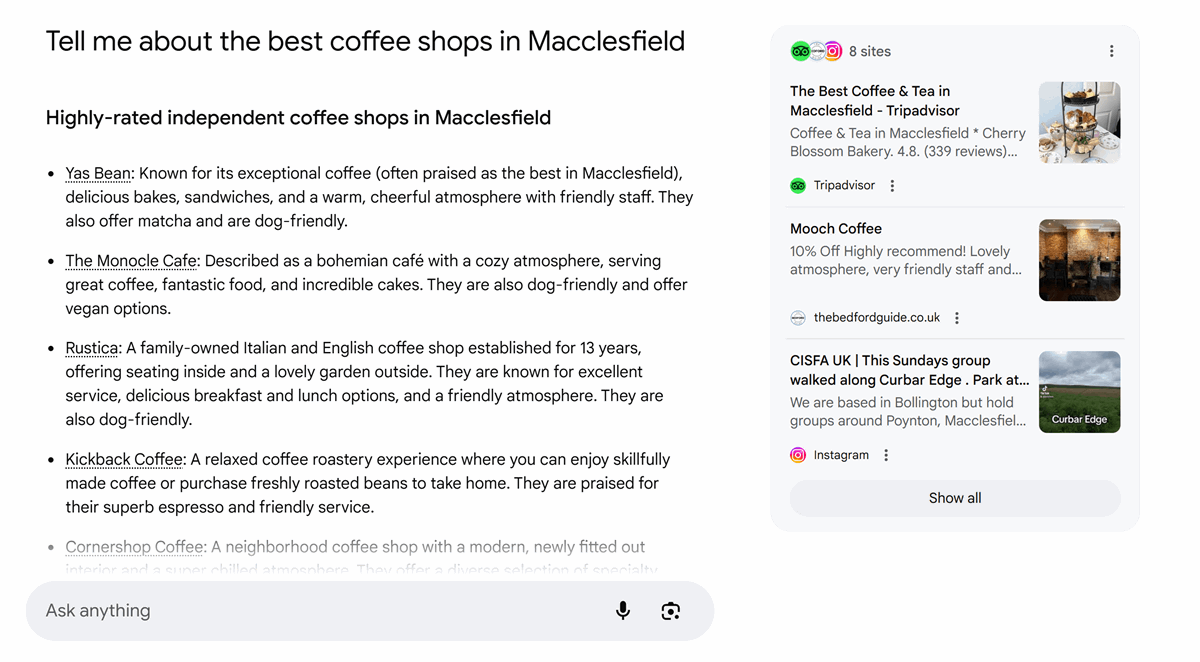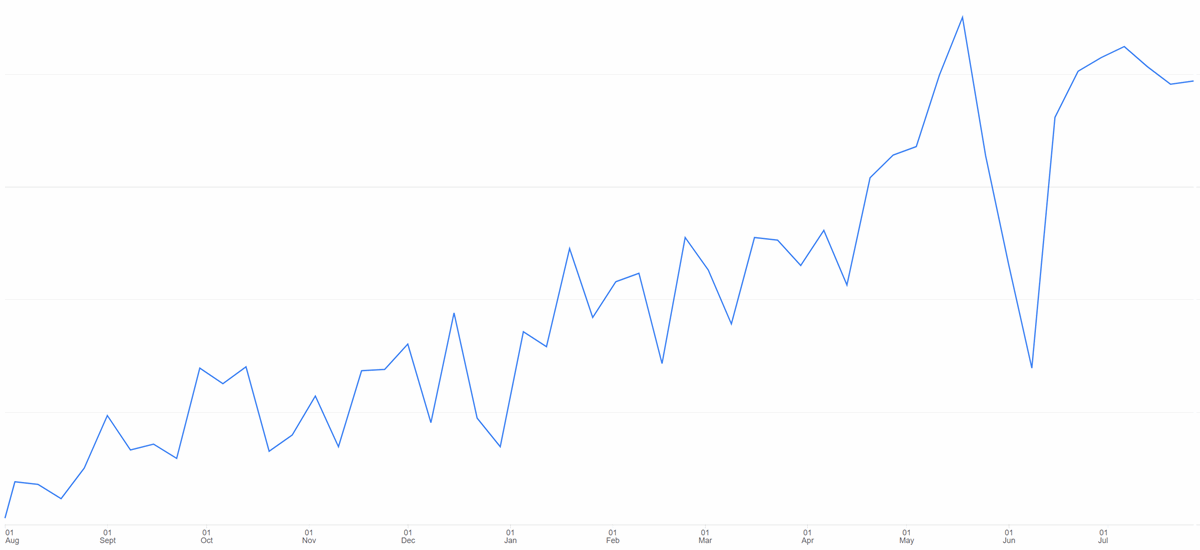AI and SEO in 2025: What do the latest updates mean for your organisation?
5 minute read
As search evolves with AI-powered answers and chat, the focus shifts to meeting people’s needs through clear, helpful content and strong site performance. Organisations that prioritise technical SEO, user experience, and trustworthy, strategic content are best placed to succeed in this changing landscape.
Among digital teams and optimisation experts, a consensus is growing that search engine optimisation (SEO) isn’t dead – but it is evolving fast, as a result of the rapid rollout of AI. Whilst it may have various different names (GEO, AEO etc.), there’s a mix of both excitement and caution out there. This is further fueled by the latest updates by Google, who have just rolled out their AI Mode in search feature internationally.
AI tools have a lot of potential, and they're making life easier for people working in optimisation in many ways. They can help analyse data, suggest keywords, and even draft content. Many marketers have embraced AI to speed up workflow and uncover insights. It’s turning SEO into a more efficient, intelligence-driven practice.
This optimism is tempered by caution though, because AI-driven search results (like Google’s AI answers or Bing’s chat replies) are changing how people find and consume information. People often get their answers straight from the search results, which means they might not click through to your website as often. This “zero-click search” trend has some site owners worried about traffic dips.
From my perspective, working in website optimisation at Nexer, AI is a double-edged sword for SEO. It takes over simple queries and provides instant answers (great for users), but this rapid change means we need to keep up, so we can support our clients and the people using their services in the best possible way.
AI chooses you.
What is AI changing about SEO?
More answers on search pages
Search engines now often display a summary or answer at the top of the page, often based on a number of sources. It’s convenient for users. The flip side is, even if your site has the relevant info, the user might not need to visit your page to get it.

A Google AI search result for "Tell me about the best coffee shops in Macclesfield" displays a list of highly-rated independent coffee shops, while a a side panel shows related listings from Tripadvisor.
Fewer clicks and different metrics
Because of these on-page answers, a lot of searches don’t lead to clicks like they used to. This impacts traditional metrics such as impression count (“your content was seen by X people on Google”) and click-through rate. So, success isn’t just about getting traffic; it’s also about being the source of those answers and building your brand reputation, even if the user doesn’t click.
Conversational queries
With the rise of AI chatbots and voice assistants, people now often search in full questions (“How can I improve my website speed?”) rather than just typing a couple of keywords (“improve site speed”). Google’s algorithm has become much better at understanding natural language and intent, so it favours content that directly addresses these conversational queries. Other search engines are also available!
Quality over quantity
AI can generate loads of content quickly - some of it useful, some of it fluff. Search engines, in response, seem to be doubling down on ranking high-quality, user-friendly content. There’s a bigger focus on expertise and trustworthiness (Google’s E-E-A-T: Experience, Expertise, Authoritativeness, Trustworthiness). In short, if your content provides real value and a great experience, it stands a much better chance of being highlighted by AI or ranked well.
How can organisations adapt?
The good news is that the best strategies to keep up with AI in SEO are aligned with solid human-centred web practices! Here are some of the steps you can take to adapt your content and optimise it for this AI-led search landscape:
- Prioritise technical SEO: Ensure your website is fast, mobile-friendly, and easy to navigate. This isn’t just an “SEO task” - it affects usability too. A fast site with a clean structure is preferred by people and search engines alike. Google rewards sites that load quickly and run smoothly on mobile. So, compress images, streamline your design, and fix any technical glitches. In short, Technical SEO is the foundation, and if your site performs well, anything AI or Google throws at you is easier to handle.
- Structure your content: Well-structured content is most accessible for users, and AI search prioritises it too. Use clear headings (almost like mini questions) and provide succinct answers or explanations in the text. For instance, if you have a services page, break out common questions (“What services do you offer?” / “How does pricing work?”) and answer them directly. This not only improves usability (visitors find info faster) but also makes it more likely Google will feature your content in a snippet or AI answer. In essence, write with the reader’s needs in mind, and organise it so they can grab information quickly. Using structured data (like FAQ schema) can also help search engines better understand your content and present it more effectively in results.
- Write naturally and helpfully: As search queries become more conversational, ensure your content sounds natural and helpful. Adopt a tone and vocabulary that reflect how your audience actually speaks, and stick to the core principles of good content design. If you anticipate a question like “Do I really need a new website to sell my product?”, consider writing a blog or FAQ that literally uses that question as a heading and then answers it. Optimising for these long-tail, real-world queries can draw in highly relevant visitors – and those are often the people who convert into customers or engaged users. It's also important to think about the role of voice search, as this is becoming increasingly prevalent. Think about the ways people might phrase questions and create your responses accordingly.
- Focus on trust and value: Rather than churning out loads of throwaway articles, invest in creating really useful resources. This could be a detailed how-to guide, a research-backed post, or an interactive tool – whatever genuinely helps your audience. Make sure to show your expertise. And if you have credentials or experience, mention it. If you cite stats or claim something, perhaps link to a reputable source or one of your case studies. Over time, building this authority and trust not only helps with SEO (since search engines pick up on positive user engagement and external references to your content), but it also means when people do come to your site, they feel confident in what you’re offering.
The bottom line
AI is changing how search works, but the core goal remains... connect people with the information they’re looking for. If you keep that front-and-centre of your strategy, a lot of the “new” SEO tactics are really just good digital practice:
- Make your website technically sound, accessible, and human-centred. A great user experience translates into SEO success.
- Craft your content to be clear, relevant, and tailored to your audience’s questions. That’s what both Google and users are looking for.
- Stay agile and keep learning. The SEO landscape will continue to shift, so be ready to adapt, whether it’s tweaking how you measure results or trying out a new tool to capture insights.
In some ways, AI is pushing SEO to be more human than ever. This means focusing on people's needs and crafting human-centred digital experiences. Organisations that embrace this approach are the ones set to thrive as search continues to evolve.
Our clients are seeing growth in traffic originating from AI chat, and we expect this trend to continue. For the majority, this currently makes up a relatively small percentage of overall traffic, but as this line chart shows, this trend is going to continue.

A line chart showing steady growth in traffic from AI-powered search over the past year.
So rather than fearing AI’s impact on your SEO, try to see it as a nudge (or maybe a strong shove!) toward better practices that ultimately benefit the people engaging with your site. If you do right by your users, you’re usually doing right by SEO, too.
At Nexer, we're helping organisations navigate this new landscape.
If you’re rethinking your approach to SEO, or wondering how to optimise your content strategy, we’d love to talk: hello@nexerdigital.com

